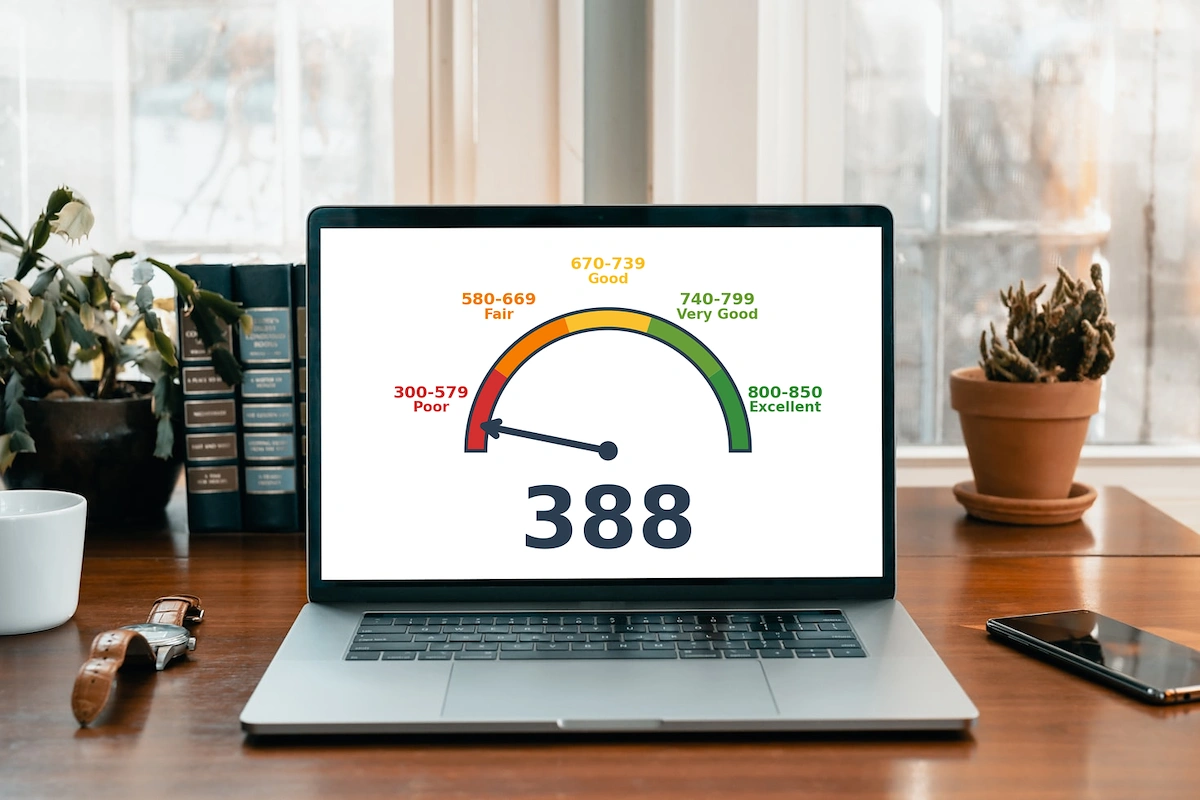
Kudos has partnered with CardRatings and Red Ventures for our coverage of credit card products. Kudos, CardRatings, and Red Ventures may receive a commission from card issuers. Kudos may receive commission from card issuers. Some of the card offers that appear on Kudos are from advertisers and may impact how and where card products appear on the site. Kudos tries to include as many card companies and offers as we are aware of, including offers from issuers that don't pay us, but we may not cover all card companies or all available card offers. You don't have to use our links, but we're grateful when you do!
388 Credit score: What You Need to Know in 2026
July 1, 2025


TL;DR
A 388 credit score is a starting point for building a stronger financial future. This score falls into the Poor FICO score range, which means there's a significant opportunity to improve your creditworthiness and unlock better financial products.
What Does a 388 Credit Score Mean?
A credit score of 388 is considered "poor" on the FICO scale, which ranges from 300 to 850. To lenders, this score indicates a high-risk borrower, making it very difficult to qualify for new loans or credit cards. Any approvals will likely come with very high interest rates and unfavorable terms, significantly increasing the cost of borrowing.
The effects of a 388 score go beyond loan applications. You might face higher insurance premiums or be required to pay larger security deposits for utilities and housing. While this score presents financial hurdles, it is not an unchangeable situation. It represents a starting point from which your credit standing can improve over time.
Who Has a 388 Credit Score?
While age is not a direct factor in credit score calculations, there is a clear correlation between age and average credit scores. Data shows that scores tend to rise as people get older, largely due to longer credit histories and more experience managing debt. According to 2023 Experian data, here is the breakdown of average FICO scores by generation:
- Generation Z (ages 18-26): 680
- Millennials (ages 27-42): 690
- Generation X (ages 43-58): 709
- Baby Boomers (ages 59-77): 745
- The Silent Generation (ages 78+): 760
Credit Cards With a 388 Credit Score
A credit score of 388 is considered very poor, placing you in a high-risk category for most lenders. As a result, securing a traditional unsecured credit card will be extremely difficult, with most applications likely facing denial. Your most viable options will be limited to secured credit cards that require a security deposit or certain unsecured cards specifically designed for rebuilding credit, which often have higher fees and interest rates.
Kudos can help you find the best credit card for your financial situation with its AI-powered tools that provide personalized recommendations based on your unique needs. The platform offers insights into how a new card may impact your credit score, ensuring you can find a suitable match from its database of nearly 3,000 options.
Auto Loans and a 388 Credit Score
A 388 credit score places you in the deep subprime category, which can make securing an auto loan challenging. While you may still find lenders willing to work with you, you can expect to face significantly higher interest rates and less favorable loan terms.
According to an automotive finance market report for 2025, average interest rates break down by credit score as follows:
- Super-prime (781-850): 5.25% for new cars and 7.13% for used cars
- Prime (661-780): 6.87% for new cars and 9.36% for used cars
- Non-prime (601-660): 9.83% for new cars and 13.92% for used cars
- Subprime (501-600): 13.18% for new cars and 18.86% for used cars
- Deep subprime (300-500): 15.77% for new cars and 21.55% for used cars
Mortgages at a 388 Credit Score
A 388 credit score is considered extremely poor and falls below the minimum threshold for nearly all mortgage products. According to mortgage requirement guidelines, even the most lenient FHA loans require a score of at least 500 with a 10% down payment. Conventional loans typically require a score of 620 or higher. As a result, traditional financing options are effectively unavailable with a 388 score.
In the highly unlikely event you found a non-traditional lender, a 388 score would lead to the most restrictive terms. You would face the highest possible interest rates, significant fees, and a large down payment requirement. Lenders would also likely cap the amount you could borrow and subject your application to stringent manual underwriting, making approval extremely difficult.
What's in a Credit Score?
Understanding your credit score can feel like trying to solve a complex puzzle, as it's a blend of several key financial habits. The most common factors that determine your score include:
- Your payment history tracks whether you have paid past credit accounts on time.
- Credit utilization is the percentage of your available credit that you are currently using.
- The length of your credit history considers the age of your oldest account and the average age of all your accounts.
- Credit mix refers to the variety of credit products you have, such as credit cards, retail accounts, and loans.
- New credit inquiries and recently opened accounts can also temporarily impact your score.
How to Improve Your 388 Credit Score
Improving your credit score is possible, regardless of your starting point, and with consistent positive behavior, you can achieve meaningful changes. Here are four proven methods to start building a healthier credit profile:
- Monitor your credit reports regularly. This allows you to identify and dispute inaccuracies that may be unfairly lowering your score. It also helps you track your progress as you work to rebuild your credit.
- Establish automatic bill payments. Your payment history is the most significant factor in your score, so making on-time payments is the most critical step toward improvement. Setting up automatic payments is a simple way to build a positive history and avoid missing due dates.
- Apply for a secured credit card. A secured card is an excellent tool for those with damaged credit, as it allows you to build a positive payment history. These accounts report to the credit bureaus, so responsible use directly helps improve your score over time.
- Become an authorized user. Being added to a responsible person's credit card can add their positive payment history and low credit utilization to your credit file. This can provide a boost to your score, especially if the primary account is in good standing.
The free Kudos browser extension can help you manage your credit cards and monitor your score as you work to improve it.
Unlock your extra benefits when you become a Kudos member

Turn your online shopping into even more rewards

Join over 400,000 members simplifying their finances

Editorial Disclosure: Opinions expressed here are those of Kudos alone, not those of any bank, credit card issuer, hotel, airline, or other entity. This content has not been reviewed, approved or otherwise endorsed by any of the entities included within the post.



































.webp)







